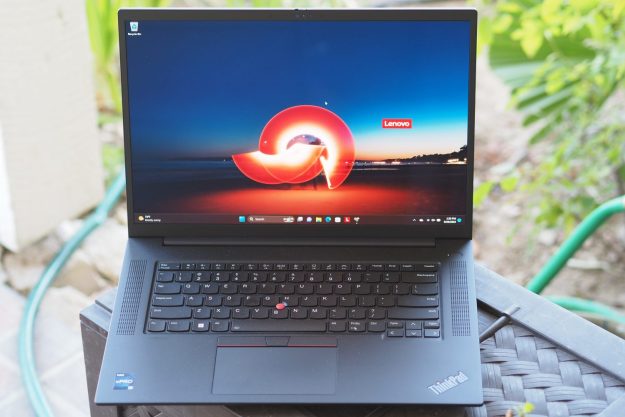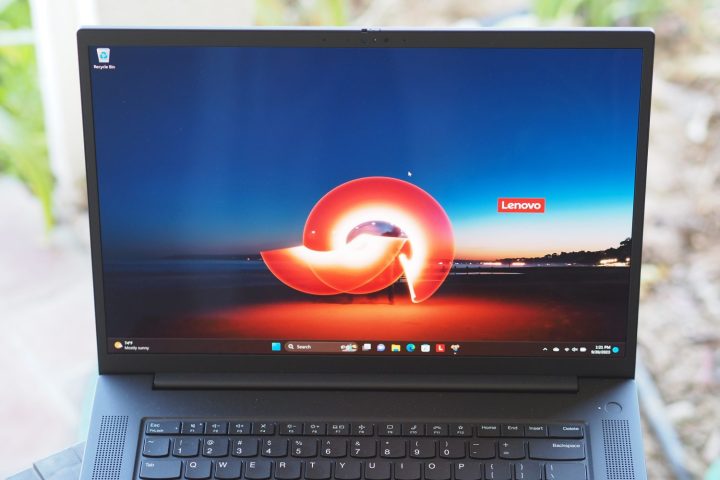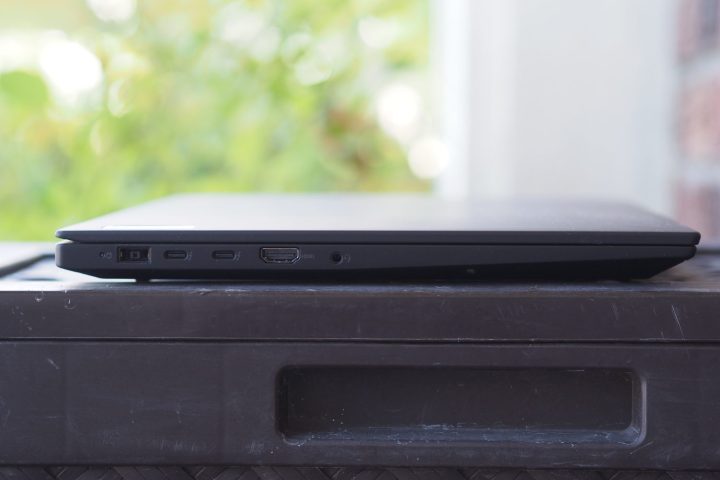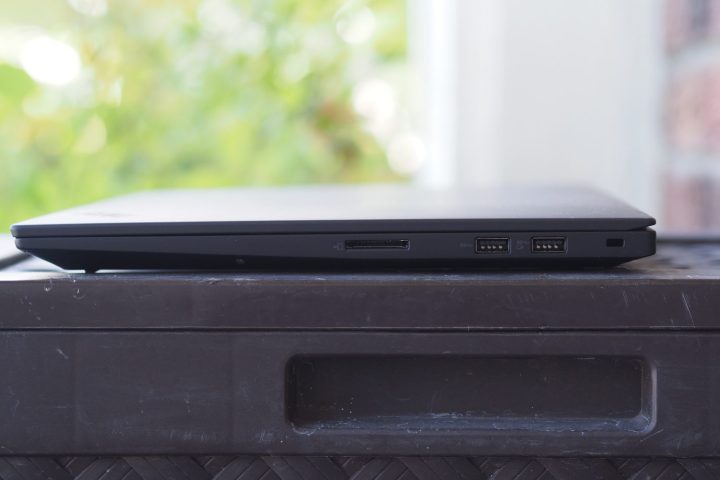
“Despite its power and compact size, the ThinkPad P1 Gen 6 struggles to justify its exorbitant price.”
- Strong productivity performance
- Solid creativity performance
- Great build quality
- Spectactular OLED display
- Good keyboard
- Incredibly expensive
- Small touchpad
- Dated design
We don’t review many portable workstations, but every now and then, one comes along that seems interesting enough to cover. The Lenovo ThinkPad P1 Gen 6 is one such machine, as it offers some very high-end components in a relatively thin and light chassis. Workstations tend to offer advanced cooling and higher and more complex configurations to justify what’s often a very high price.
And the ThinkPad P1 Gen 6 is definitely expensive. Our review configuration, which isn’t the highest configuration available, costs a whopping $5,394. It would have to offer excellent performance for creators and other professionals to justify this kind of price. Unfortunately, it did not, and you can buy a high-end consumer or gaming laptop and get similar or better performance for a lot less.
Specs and configurations
| Lenovo ThinkPad P1 Gen 6 | |
| Dimensions | 14.1 inches x 9.6 inches x 0.68 inches |
| Weight | 3.92 pounds |
| Processor | Intel Core i7-13700H Intel Core i7-13800H vPro Intel Core i9-13900H vPro |
| Graphics | Nvidia RTX A1000 Nvidia GeForce RTX 4060 Nvidia RTX 2000 Ada Nvidia GeForce RTX 4080 Nvidia RTX 3500 Ada Nvidia RTX 4000 Ada |
| RAM | 8GB DDR5-5600 16GB DDR5-5600 32GB DDR5-5600 48GB DDR5-5600 64GB DDR5-5600 96GB DDR5-5600 |
| Display | 16.0-inch 16:10 WUXGA (1,920 x 1200) IPS, 60Hz 16.0-inch 16:10 WQXGA (2,560 x 1,600) IPS, 165Hz 16.0-inch 16:10 WQUXGA (3,840 x 2,400) OLED, 60Hz |
| Storage | 256GB SSD 512GB SSD 1TB SSD 2TB SSD 4TB SSD Dual SSD option |
| Touch | Yes |
| Ports | 2 x USB-C with Thunderbolt 4 2 x USB-A 3.2 Gen 1 1 x HDMI 2.1 1 x microSD card reader 1 x 3.5mm audio jack 1 x nanoSIM card reader (optional) |
| Wireless | Wi-Fi 6E and Bluetooth 5.1 Optional 4G WWAN Optional NFC |
| Webcam | 1080p with infrared camera for Windows 11 Hello 5MP with infrared camera for Windows 11 Hello (OLED) |
| Operating system | Windows 11 |
| Battery | 90 watt-hour |
| Price | $3,609+ |
Lenovo offers a dizzying array of configuration options for the ThinkPad P1 Gen 6. The entry-level configuration is $3,609 for a Core i5-13700H, 8GB of RAM, a 256GB SSD, a 16.0-inch WUXGA (1,920 x 1,200) IPS display, and an Nvidia RTX A1000 workstation GPU. That’s a lot of money for a pedestrian configuration. You’ll spend $6,434 for a Core i9-13900H vPro, 96GB of RAM, a 4TB SSD, a 16.0-inch WQUXGA (3,840 x 1,200) OLED display, and an Nvidia RTX 5000 Ada workstation GPU. My review configuration cost $5,394 for a Core i7-13800H vPro, 32GB of RAM, a 1TB SSD, the OLED display, and an Nvidia GeForce RTX 4080 GPU.
You can mix and match components to spend more or less, but you’re starting at a high entry-level price and ramping up to incredibly expensive. So, the ThinkPad P1 Gen 6 needs to offer outstanding performance to justify these kinds of prices.
Underwhelming performance for the price

Portable workstations are all about performance on the go. They typically feature the fastest CPUs and GPUs, along with advanced cooling to ensure maximum speed in demanding applications for fields like creativity and engineering. While thin and light workstations like the ThinkPad P1 Gen 6 aren’t going to be as fast as heavier and thicker options, they should still provide performance that matches their high price.
Unfortunately, that wasn’t the case with the ThinkPad P1 Gen 6. My review unit was equipped with a Core i7-13800H, a slightly faster variation of the 45-watt Core i7 with 14 cores (six Performance cores at up to 5.2GHz and eight Efficient cores at up to 4GHz) and 20 threads. The CPU also includes Intel’s vPro technology for better security and integration with enterprise management systems. My review unit used an Nvidia GeForce RTX 4080, a very fast GPU, but not one that’s optimized for the kinds of apps that workstations typically run. Lenovo also offers workstation-class GPUs up to Nvidia’s RTX 5000 Ada, which would theoretically provide better performance and more reliability in the relevant workflows.
I can only comment on the configuration I reviewed, but it wasn’t all that impressive, especially at a price of $5,394. In the table below, I compared it to mainstream laptops because we don’t have a large database of workstations to draw upon. But each of these machines is thousands of dollars less than the ThinkPad P1 Gen 6. And as you can see, their performance was equal to or better than the Lenovo workstation. That was particularly true of the Lenovo Legion Pro 7i, a gaming machine that’s around half the price and offers significantly faster performance.
In our CPU-intensive benchmarks, the ThinkPad P1 Gen 6 was faster than the other laptops with the Core i7-13700H only in the Cinebebench R23 benchmark. There, it was closer in performance to the faster Core i9-13900H. However, it wasn’t impressive in our Handbrake test that encodes a 420MB video as H.265. In the PugetBench Premiere Pro benchmark, which runs in a live version of Adobe’s Premiere Pro and uses the GPU to speed up various processes, the ThinkPad P1 Gen 6 was particularly disappointing, especially given its Nvidia GeForce RTX 4080 GPU. It was the second-slowest laptop in this comparison group, and was beat out by the Dell XPS 15 that used an underclocked version of the RTX 4070.
Simply put, the ThinkPad P1 Gen 6 was an unimpressive performer. For creators, it’s certainly disappointing and not worth the price. I can’t attest to how the laptop would run other workstation-class applications, but from these results, there’s no reason to assume it will justify its extremely high investment.
| Geekbench (single/multi) |
Handbrake (seconds) |
Cinebench R23 (single/multi) |
Pugetbench Premiere Pro |
|
| Lenovo ThinkPad P1 Gen 6 (Core i7-13800H / RTX 4080) |
Bal: 1,849 / 11,536 Perf: 1,857 / 11,494 |
Bal: 75 Perf: 72 |
Bal: 1,942 / 15,248 Perf: 1,991 / 15,219 |
Bal: 808 Perf: 922 |
| Lenovo Slim Pro 9i (Core i9-13905H / RTX 4050) |
Bal: 1,688 / 13,283 Perf: 1,667 / 13,884 |
Bal: 71 Perf: 63 |
Bal: 1,690 / 16,645 Perf: 1,691 / 18,085 |
Bal: 912 Perf: 1,114 |
| Lenovo Legion Pro 7i (i9-13900HX / RTX 4080) |
Bal: 2,020 / 19,041 Perf: 1,951 / 20,694 |
Bal: 55 Perf: 51 |
Bal: 2,096 / 22,596 Perf: 2,046 / 28,263 |
Bal: 1,151 Perf: 1,436 |
| MSI Prestige 16 Studio (Core i7-13700H / RTX 4060) |
Bal: 1,880 / 6,951 Perf: 1,903 / 11,945 |
Bal: 139 Perf: 80 |
Bal: 1,797 / 7,959 Perf: 1,921 / 13,647 |
Bal: 668 Perf: 865 |
| Dell XPS 15 (9530) (Core i7-13700H / RTX 4070) |
Bal: 1,787 / 11,978 Perf: 1,830 / 11,769 |
Bal: 79 Perf: 76 |
Bal: 1,865 / 13,386 Perf: 1,868 / 13,927 |
Bal: 866 Perf: 1,023 |
| Apple MacBook Pro 14 (M2 Max 10/38) |
Bal: 1,973 / 14,596 Perf: N/A |
Bal: 85 Perf: N/A |
Bal: 1,608 / 14,789 Perf: N/A |
Bal: 1,093 Perf: N/A |
Workstations aren’t intended for gaming, but there’s no reason not to run our suite of gaming benchmarks on a laptop with such a powerful GPU. Here, the ThinkPad P1 Gen 6 wasn’t terribly impressive against some gaming laptops, with its lowest scores in Assassin’s Creed Valhalla (a glitch caused a particularly low score in performance mode). Once again, price is a factor: you can spend a lot less and get a much faster gaming laptop. Note that you’ll definitely want to dial up performance mode because that had a huge impact on frame rates.
| 3DMark Time Spy | Assassin’s Creed Valhalla (1080p Ultra High) |
Cyberpunk 2077 (1080p Ultra) |
Civilization 6 (1080p Ultra) |
|
| Lenovo ThinkPad P1 Gen 6 (RTX 4080) |
Bal: 9,806 Perf: 13,615 |
Bal: 71 fps Perf: 30 fps |
Bal: 67 fps Perf: 105 fps |
Bal: 160 fps Perf: 198 fps |
| Lenovo Legion Pro 7i (RTX 4080) |
Bal: 18.017 Perf: 18,382 |
Bal: 125 Perf: 129 fps |
Bal: 114 fps Perf: 113 fps |
Bal: 217 fps Perf: 219 fps |
| MSI GT77 Titan 2023 (RTX 4090) |
Bal: N/A Perf: 20,836 |
Bal: N/A Perf: 150.9 fps |
Bal: N/A Perf: 132.7 fps |
N/A |
| Razer Blade 17 (RTX 3080 Ti) |
Bal: 12,6334 Perf: N/A |
Bal: 83 fps Perf: N/A |
Bal: 91 fps Perf: N/A |
N/A |
A ThinkPad through and through

From the outside, the ThinkPad P1 Gen 8 looks like every other old-school ThinkPad. It’s all-black with red accents, such as the red LED dot over the ‘i” in the logo on the lid and the red TrackPoint nubbin in the center of the keyboard. You’d have a hard time telling the difference between it and the ThinkPad X1 Extreme that has a similar carbon fiber weave on the outside of the display. That’s not a bad thing, because it’s an attractive aesthetic, but it does seem a bit dated compared to newer ThinkPads. The ThinkPad Z16, for example, has a much more modern appearance.
The ThinkPad P1 Gen 8 is also constructed a lot like a traditional ThinkPad, which is also a good thing. It’s made of aluminum in the bottom chassis and carbon fiber in the lid. It’s not perfect, though. While the chassis is rigid, the lid has a little give. That’s common with carbon fiber constructions, and it doesn’t mean it’s not a sturdy laptop. As usual, Lenovo submitted the machine to military tests of durability.
While the laptop is relatively thin at 0.68 inches and light at 3.92 pounds, it’s still a larger laptop due to generous display bezels. Even so, it’s slightly thinner and lighter than the Dell XPS 15 that comes in at 0.71 inches thick and 4.23 pounds. Packing a lot of power into a thin and light chassis is the ThinkPad P1 Gen 8’s main redeeming feature.

The keyboard is the usual ThinkPad variety, with large sculpted keycaps and plenty of key spacing. The switches are deep, yet they’re lighter and snappier than some ThinkPad keyboards I’ve tried. I like it quite a bit, almost as much as the Magic Keyboard on Apple’s recent MacBooks. The TrackPoint nubbin works well for those who like that kind of controller, but the extra buttons it requires takes away space from the mechanical touchpad. It’s still large enough, and it’s comfortable to use with firm, confident, and quiet clicks, but other 16-inch laptops have larger versions.
Connectivity is generous, with a mix of modern and legacy ports. My only complaint is the use of a microSD card reader when there’s plenty of space for a full-size version. Wireless connectivity is up to date, and there’s an option for 4G WWAN support.
Finally, the webcam is 1080p on the models with IPS displays and 5MP on the OLED versions. The latter provides a particularly good image for videoconferencing. An infrared camera supports Windows 11 Hello facial recognition, and there’s also a fingerprint reader embedded in the power button. The infrared camera also supports Lenovo’s user presence sensing technology that can put the laptop to sleep when the user walks away and wake it up when the user returns. It’s nice to have, but it’s not unique to the ThinkPad P1 Gen 6.
The usual OLED goodness

I reviewed the ThinkPad P1 Gen 6 with its 4K+ OLED display, and it’s spectacular, as usual. It’s an incredible experience out of the box, both colorful and offering up inky blacks.
According to my colorimeter, it’s objectively as good as it seems. It’s bright at 388 nits, with wide colors hitting 100% of sRGB, 97% of AdobeRGB, and 100% of DCI-P3. The colors are also very accurate, with a DeltaE of 0.82 (less than 1.0 can’t be discerned by the human eye). As has been the case with many recent OLED panels, my colorimeter didn’t return a result for the contrast ratio, but I’m certain it’s just as high as all OLED displays.
Creators, productivity users, and media consumers will all love this display. The latter will appreciate the Dolby Vision support, which tends to provide the best high dynamic range (HDR) support. The display’s not bright enough for the best experience with such content, but it’s still a plus.
Audio is provided by two upward-firing speakers. The volume is just sufficient for a small home office, and while mids and highs are clear enough, there’s absolutely no bass. You’ll want headphones or external speakers for anything other than the occasional YouTube video.
A confusing proposition
Try as I might, I had a hard time justifying the ThinkPad P1 Gen 6’s price. Yes, it’s fast, but it’s not faster (or, in some cases, as fast) as mainstream machines costing thousands of dollars less. It’s well-built, but so are all ThinkPads, including the less costly ThinkPad X1 Extreme that’s likely as fast in its latest generation.
There’s a three-year warranty, which is better than the one-year standard with mainstream laptops, but most offer upgrades that match what’s available with the ThinkPad P1 Gen 6. Everything considered, this portable workstation is hard to recommend.
Editors’ Recommendations
Services Marketplace – Listings, Bookings & Reviews


